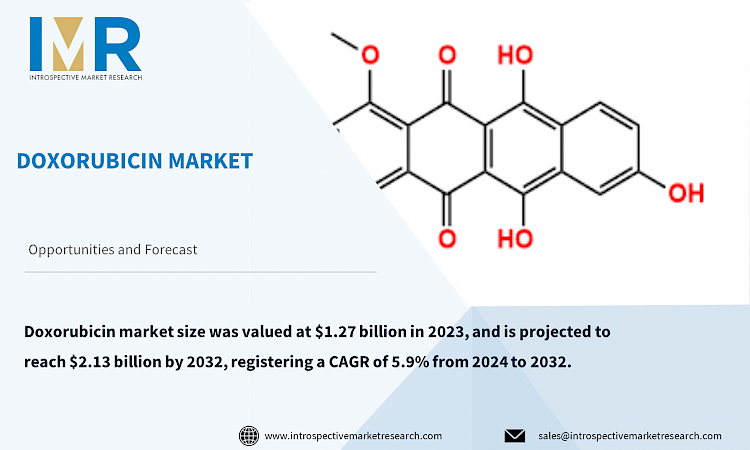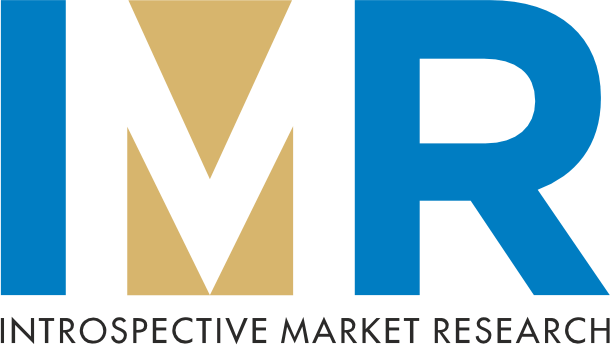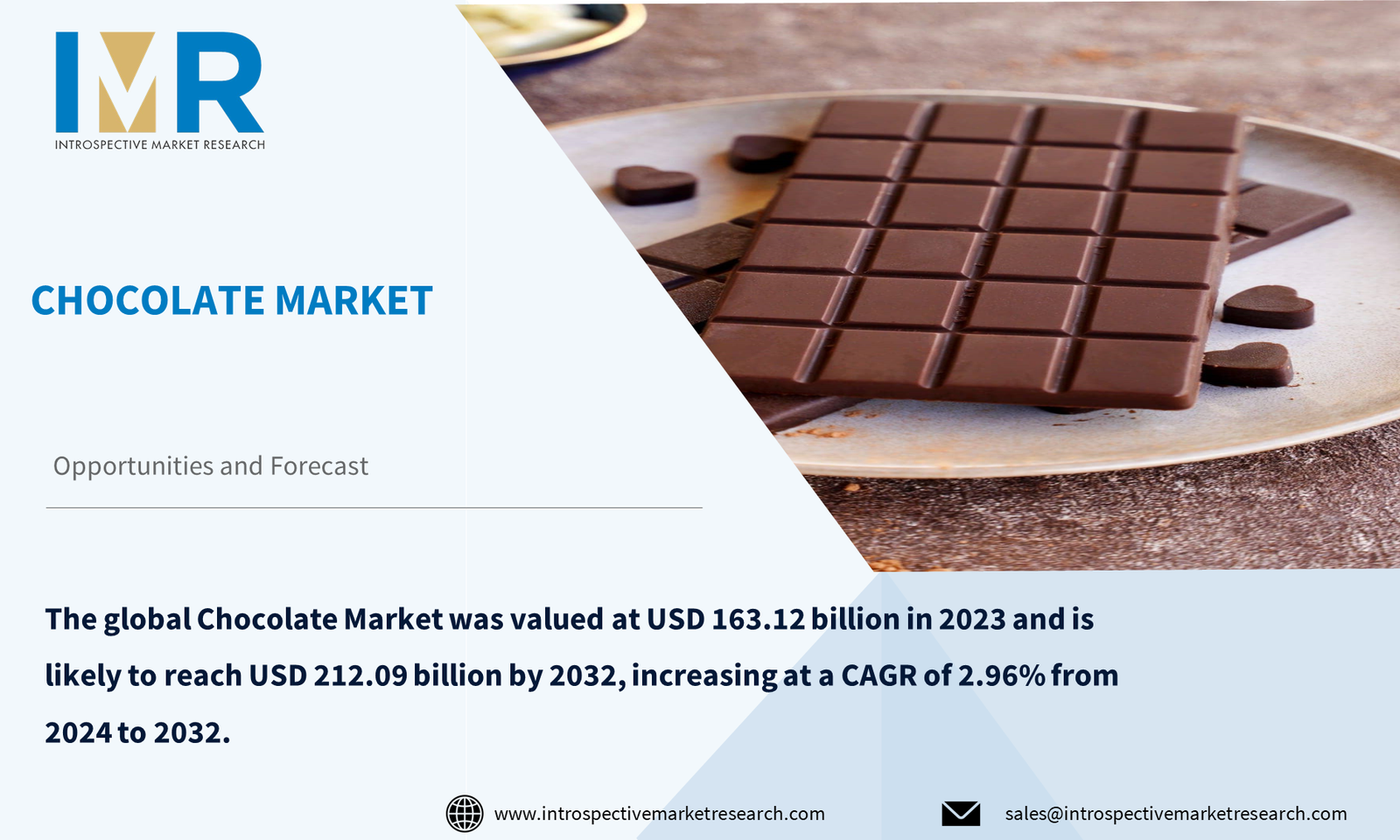
According to a new report published by Introspective Market Research, titled, “Doxorubicin Market by Formulation, Application, Distribution Chanel: Global Opportunity Analysis and Industry Forecast, 2024–2032,” the global Doxorubicin market size was valued at $1.27 billion in 2023, and is projected to reach $2.13 billion by 2032, registering a CAGR of 5.9% from 2024 to 2032. Doxorubicin stands as a cornerstone in cancer therapy, wielding its potency across a spectrum of malignancies from breast cancer to lymphoma. As an anthracycline, its mechanism of action disrupts cancer cell DNA, impeding replication and inducing oxidative stress, ultimately leading to cell death. Its versatility extends beyond standalone use, often integrated into multidrug regimens or alongside other treatment modalities like surgery or radiation therapy. However, its efficacy comes with a price as cardiotoxicity looms as a significant concern, necessitating vigilant monitoring and ongoing research into safer delivery methods.
Despite the formidable challenges posed by its side effects, Doxorubicin remains indispensable in the oncologist's arsenal, continually evolving with innovations aimed at mitigating its drawbacks while maximizing therapeutic impact. Through meticulous monitoring and strategic integration into comprehensive cancer management plans, its role persists as a vital agent in the fight against cancer, underscoring the delicate balance between efficacy and safety in the quest for improved patient outcomes.
The increasing prevalence of cancer presents a formidable global health challenge driven by factors such as population aging, lifestyle changes, and environmental influences. This surge in cancer cases necessitates a robust market for innovative solutions, spanning diagnostics, therapies, and research initiatives. Governments, biopharmaceutical companies, and healthcare providers are investing significantly in R&D to meet the escalating demand for effective cancer management strategies. This collective effort fuels advancements in precision medicine, targeted therapies, and diagnostic technologies, underscoring the urgency to address the multifaceted complexities of cancer care.
In response to the limitations of traditional intravenous administration, the development of new formulations of Doxorubicin represents a significant stride towards optimizing cancer treatment. Innovations such as liposomal formulations and nanoparticle-based delivery systems aim to enhance drug delivery efficiency, minimize side effects, and improve therapeutic outcomes. Moreover, exploring the potential of oral formulations holds promise for enhancing patient convenience and adherence, potentially reshaping the landscape of cancer treatment by offering more accessible and patient-friendly options. As research in this area progresses, these advancements herald a new era in cancer therapeutics, driven by the imperative to enhance both efficacy and patient experience.
Global Doxorubicin Market, Segmentation
The Doxorubicin market is segmented based on formulation, application, distribution channel and region.
By Formulation:
The doxorubicin injection segment typically dominates the global market. This dominance stems from several factors. Firstly, doxorubicin injection offers convenience and ease of administration, especially in clinical settings where intravenous delivery is standard practice for chemotherapy. The ready-to-use nature of the injection formulation simplifies the treatment process, making it preferable for healthcare providers and patients alike. Additionally, doxorubicin injection formulations have been extensively studied and utilized over the years, establishing a strong track record of efficacy in various cancer types. This familiarity and established efficacy contribute to its widespread adoption and dominance in the market.
Distribution Chanel:
The Hospital Pharmacy segment is poised to dominate the doxorubicin market during the forecast period, buoyed by its pivotal role in patient care and medication management within the healthcare ecosystem. As integral components of hospital infrastructure, these pharmacies ensure the timely dispensing and administration of crucial medications, including doxorubicin, across various medical specialties. With a focus on patient safety, adherence, and treatment optimization, hospital pharmacies collaborate closely with healthcare providers to enhance therapeutic outcomes and ensure the highest standards of care. This multifaceted role positions hospital pharmacies as key drivers in meeting the diverse needs of patients undergoing cancer treatment, solidifying their dominance in the doxorubicin market.
Region:
North America's dominance in the global market over the forecast period is underpinned by its robust economic prowess, technological innovation, and well-developed infrastructure. Spearheaded by key players such as the US and Canada, the region boasts a dynamic landscape characterized by continuous advancements in fields like biotechnology, artificial intelligence, and information technology. With renowned research institutions and a culture that fosters innovation, North America remains at the forefront of research and development, particularly in critical sectors like healthcare and pharmaceuticals. Government support, coupled with a thriving entrepreneurial ecosystem, further solidifies the region's position, attracting investment, talent, and cutting-edge technologies, thereby sustaining its dominance in the global market.
Key Players in the Global Doxorubicin Market
- Pfizer Inc. (U.S.)
- Baxter International Inc. (U.S.)
- Johnson & Johnson Services, Inc. (U.S)
- Hikma Thymoorgan Pharmazie GmbH (Germany)
- Synbias Pharma AG (Switzerland)
- Novartis International AG (Switzerland)
- Sandoz AG (Switzerland)
- Accord Healthcare Ireland Ltd. (Ireland)
- Cadila Pharmaceuticals (India)
- Cipla Limited (India)
- SRS Pharmaceuticals Pvt. Ltd (India)
- Sun Pharmaceutical Industries Ltd. (India)
- Zydus Group ((India)
- Reddy’s Laboratories Ltd. (India)
- Glenmark Pharmaceuticals Ltd (India)
- Meiji Seika Pharma Co. Ltd. (Japan)
- MicroBiopharm Japan Co., Ltd. (Japan)
- Teva Pharmaceutical Industries Ltd. (Israel)
- Boryung Pharmaceutical Co., Ltd. (South Korea), and Other Major Players
Key Industry Developments
- In August 2021, Genentech announced positive results from the pivotal Phase III POLARIX trial investigating Polivy (polatuzumab vedotin) in combination with Rituxan (rituximab) plus cyclophosphamide, doxorubicin, and prednisone (R-CHP) versus Rituxan plus cyclophosphamide, doxorubicin, vincristine, and prednisone (R-CHOP). The company stated that it met the primary endpoint by demonstrating significantly improved and clinically meaningful progression-free survival in people with previously untreated diffuse large B-cell lymphoma (DLBCL).
- In October 2021, Padagis, in partnership with Ayana Pharma Ltd, received approval from the US FDA to launch its AB-rated generic version of Doxil (Doxorubicin Liposome Injection).
Key Findings of the Study
- The global Doxorubicin market size was valued at $1.27 billion in 2023, with a projected growth to $2.13 billion by 2030, representing a CAGR of 5.9% from 2024 to 2032.
- Doxorubicin remains a cornerstone in cancer therapy due to its potency across a spectrum of malignancies, disrupting cancer cell DNA and inducing cell death.
- The increasing prevalence of cancer, driven by factors like population aging and lifestyle changes, necessitates innovative solutions across diagnostics, therapies, and research initiatives.
- The dominance of the doxorubicin injection segment and the Hospital Pharmacy distribution channel underscores the importance of convenience, established efficacy, and patient-centric care in cancer management, with North America leading in economic strength, technological innovation, and healthcare infrastructure to sustain its dominance in the global market.






